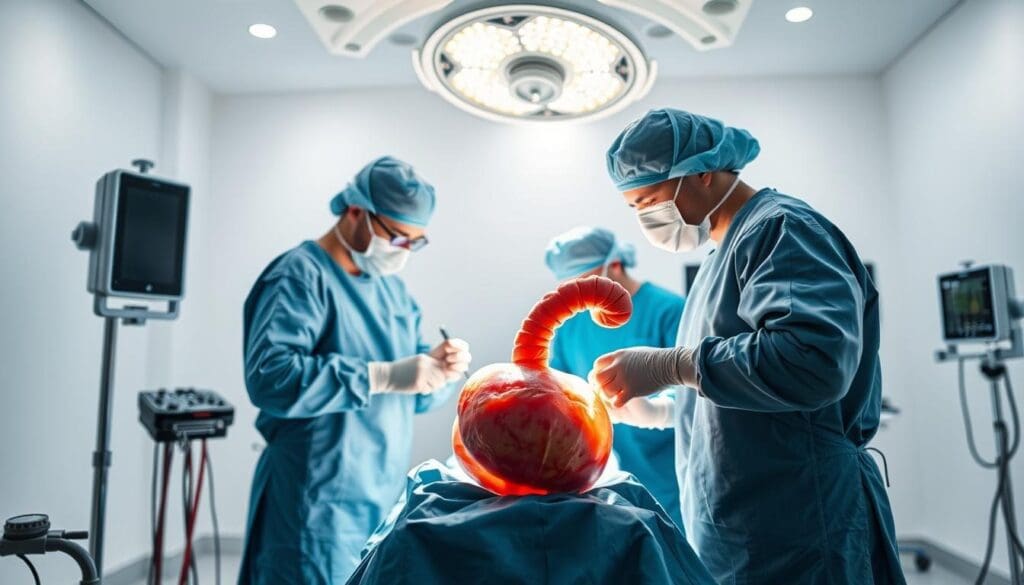
When you face colon cancer, knowing your surgery options is key. At Liv Hospital, we give personalized care. We use the latest methods to help our patients get the best results. Discover the 5 main colon cancer surgery types and how each procedure removes cancer tumors.
Colon cancer surgery is a main treatment for both early and advanced cases. We choose the right surgery based on the tumor’s size, where it is, and how far it has spread. This can range from simple procedures during a colonoscopy to more complex surgeries like colectomy.
We know every patient is different, so we make treatment plans just for you. Our team of experts is committed to top-notch care. We make sure you get the newest surgical methods in a safe place.

It’s important for patients to understand colon cancer and surgery. Colon cancer, or colorectal cancer, occurs when cancer cells grow in the colon or rectum. Treatment plans vary based on the tumor’s size, location, and stage.
Colon cancer usually starts as a polyp, a growth on the colon or rectum’s inner lining. Some polyps can turn cancerous over time. Early detection through screening is key to removing polyps before they become cancerous.
Surgery is a main treatment for colon cancer that hasn’t spread far. The choice to have surgery depends on the cancer’s stage, the patient’s health, and other factors. In many cases, surgery is the first step, aiming to remove the tumor and affected parts of the colon or rectum. Chemotherapy may be used to kill any remaining cancer cells.
We help patients choose the best treatment, considering the cancer’s stage and the patient’s health. Our team is committed to providing detailed care. We ensure patients get the right treatment for their condition.

Colon cancer surgery is tailored to each person. It depends on the tumor’s characteristics and the patient’s health. At Liv Hospital, our team works together to create a treatment plan for each patient.
The size and location of the tumor are key in choosing surgery. Larger tumors or those in certain parts of the colon might need more complex surgeries. Our surgical team uses advanced imaging to plan the best surgery.
Tumors in the rectum might need special surgery to maintain anal function. The tumor’s distance to important structures also affects the surgery plan.
The cancer’s stage and whether it has spread are important for surgery. Early cancers might need less invasive surgeries, while advanced cancers might need more.
“The goal of surgery is to remove the cancerous tumor and any affected surrounding tissue, ensuring the best possible outcome for the patient.”
Liv Hospital Surgical Team
Our team looks at the cancer stage and spread when choosing surgery. This includes considering if the cancer has spread to lymph nodes or other parts of the body.
| Cancer Stage | Typical Surgical Approach |
| Early-stage | Polypectomy or local excision |
| Advanced | Colectomy with lymph node dissection |
The patient’s overall health and any medical conditions are also important. Patients with certain health issues might need a different surgical plan to reduce risks.
Our multidisciplinary team works with patients to understand their health. We plan surgery that treats cancer well while also considering the patient’s health.
By looking at these factors, we can choose the best surgery for each patient. This ensures the best outcomes for everyone.
Polypectomy is a key procedure for catching colon cancer early. It removes precancerous and small tumors during a colonoscopy. This method is a big help in stopping colon cancer and has a short recovery time.
A colonoscopy is when a doctor uses a flexible tube with a camera to look inside the colon. This helps find polyps, tumors, and other issues. Patients are usually sedated to make them comfortable.
The colonoscopy uses a special tool called a colonoscope. It has a camera, light, and channels for tools. The tube’s flexibility lets it reach all parts of the colon for a detailed check.
There are different ways to remove polyps and small tumors during a polypectomy. The choice depends on the polyp’s size, location, and type. Here are the main methods:
Recovering from a polypectomy is usually fast. Most people can go back to their normal routine in a day or two. The success rate of removing precancerous and small tumors is high, thanks to colonoscopies.
Research shows polypectomy can lower colon cancer risk by removing polyps early. It’s important to have regular colonoscopies to catch and remove new polyps early.
Colectomy is when part or all of the colon is removed. It’s often needed for big tumors or advanced colon cancer. This surgery is key to treating colon cancer by taking out the bad part of the colon.
A partial colectomy removes the tumor part of the colon and some healthy tissue around it. This helps keep more of the colon working.
The surgeon also takes out lymph nodes during this surgery. This is to see if the cancer has spread. Knowing this helps figure out the cancer’s stage and if more treatment is needed.
Sometimes, a total colectomy is needed, where the whole colon is removed. This is usually for people with certain genetic conditions or extensive disease.
This surgery is more serious and affects the patient’s quality. It often means creating an ileostomy or ileal pouch for stool passage.
Lymph node dissection is a key part of colectomy surgery. It removes lymph nodes near the tumor to check for cancer spread. The number of nodes checked affects how accurate the cancer staging is.
Knowing if the cancer has spread to the lymph nodes helps plan treatment. This might include chemotherapy or radiation therapy.
| Type of Colectomy | Description | Indications |
| Partial Colectomy | Removal of the portion of the colon containing the tumor | Localized tumors, preserving colon function |
| Total Colectomy | Removal of the entire colon | Extensive disease, genetic predispositions |
Colon cancer surgery has made big strides, thanks to laparoscopic and robot-assisted surgery. These new methods are changing how we treat colon cancer. They offer patients less invasive options, leading to faster recovery times.
Laparoscopic colon surgery is a minimally invasive method. It uses small incisions in the abdomen to remove cancerous parts of the colon. This approach causes less damage and trauma than traditional surgery.
Patients often experience less post-operative pain and faster recovery. They usually have shorter hospital stays and can get back to their daily activities sooner.
The surgery uses a laparoscope, a thin tube with a camera, to see inside the abdomen. Special instruments are used for dissection and removal. Benefits include reduced scarring, less blood loss, and lower risk of complications.
Robot-assisted surgery is another advanced method for treating colon cancer. It uses a robotic system to help the surgeon, improving precision and control. This is great for complex cases.
One big plus is the three-dimensional view it offers. This helps in removing tumors and surrounding tissue more accurately. It can lead to better outcomes and lower recurrence rates.
The choice between open and minimally invasive surgery depends on several factors. These include the cancer stage, patient health, and surgeon expertise. While open surgery is traditional, minimally invasive methods are gaining popularity.
Minimally invasive surgeries often mean less pain, quicker recovery, and fewer complications. But the right choice depends on the patient’s specific needs and health.
We see a bright future for colon cancer surgery with these advanced techniques. They offer patients more options and better results.
For some colon cancer patients, ostomy procedures are a key part of their treatment. An ostomy brings a part of the intestine to the belly, allowing waste to exit through the stoma. This can be temporary or permanent, based on the cancer’s extent.
A colostomy brings a part of the colon to the belly. The choice between temporary and permanent depends on the tumor’s location and the patient’s health. A temporary colostomy helps the colon heal, while a permanent one is needed when part of the colon is removed.
Key considerations for colostomy include:
An ileostomy brings the ileum to the belly, creating a stoma. It’s often used for lower colon or rectum cancers. Like a colostomy, it can be temporary or permanent.
The ileostomy procedure involves bringing the ileum to the abdominal Assurfacients get detailed guidance on managing their ileostomy, including stoma care and body adjustments.
Living with an ostomy requires adjustments, but with support, patients can live well. Our team at Liv Hospital offers support and education. This includes stoma care, dietary advice, and managing complications.
Patients are encouraged to:
Understanding ostomy procedures helps colon cancer patients navigate their treatment journey with confidence and support.
Rectal cancer surgery uses many procedures tailored for each patient. These surgeries are chosen to help patients get the best results.
Proctectomy is key for many rectal cancer patients. It involves removing the rectum. The method used depends on the tumor’s location and the patient’s health.
The main goal is to remove the cancer while keeping as much normal tissue as possible. Sometimes, proctectomy is done with other treatments like chemotherapy or radiation. This ensures the patient gets full care.
TAMIS is a special surgery for rectal tumors. It’s less invasive than open surgery. This means patients have less recovery time and fewer complications.
For advanced or complex rectal cancer, combined surgical methods are needed. A team of surgeons works together to create a treatment plan for each patient.
Factors like tumor size, location, and the patient’s health are considered. By mixing different surgeries, like proctectomy and TAMIS, outcomes and quality of life can improve.
At Liv Hospital, we help our patients get ready for colon cancer surgery. We make sure they are fully prepared for the procedure.
Before surgery, patients go through tests and evaluations. These check their health and the cancer’s extent. They help us choose the best surgery and spot any risks.
Pre-surgical testing includes:
Cleansing the colon is key before surgery. It lowers the risk of infection during and after surgery.
Effective bowel prep involves:
Getting ready for surgery is not just about physical health. Mental preparation is also vital. We encourage patients to share their fears and worries with us.
To prepare mentally and physically, patients can:
The journey to recovery after colon cancer surgery is different for everyone. It mixes medical care with personal strength. We help our patients through this time, focusing on support and care for a smooth return to life.
Right after surgery, patients are watched for any issues. They get clear instructions on diet, activity, and wound care. Our team at Liv Hospital works hard to help manage pain and solve any early recovery problems.
Key aspects of immediate post-operative care include:
Recovery times vary, but most get back to normal in weeks to months. It’s key to stick to the recovery plan from our healthcare team. This helps healing and lowers the risk of problems.
During this time, patients should:
Life after surgery is not just about physical healing. It’s also about emotional and mental adjustment. Our team offers support and resources for these changes. We help with managing surgery’s long-term effects and adjusting to new lifestyle needs.
It’s normal to feel a range of emotions during recovery. Our patients can use our support services, like counseling and support groups. These help with the emotional side of their journey.
Colon cancer treatment now focuses on a team effort. This team makes sure each patient gets the best care. They create a treatment plan that fits each person’s needs.
Our surgical team is key in treating colon cancer. They are skilled surgeons who focus on colon cancer. They work with other experts to cover all parts of a patient’s care.
Working with oncology and radiation is vital. Our team of doctors and therapists plans treatments c,hemotherapy ,and radiation. They work with surgeons to make a plan that might include surgery, too.
This teamwork makes sure treatments work well together. Patients get a complete care experience.
Our approach focuses on each patient’s unique situation. We consider the cancer’s stage, location, and the patient’s health. This way, we create a treatment plan that’s just right for them.
At places like Liv Hospital, this teamwork is possible. It leads to a plan that fights cancer well and also thinks about the quality of life in fthe uture.
| Specialist | Role in Treatment |
| Surgeon | Performs surgical removal of tumors and affected tissues |
| Medical Oncologist | Administers chemotherapy and other medical treatments |
| Radiation Therapist | Provides radiation therapy to target cancer cells |
Our team works together to give patients the best care. They make sure every part of colon cancer treatment is covered.
Advances in colon cancer surgery have greatly improved patient outcomes. This brings new hope to those with this disease. At Liv Hospital, we are dedicated to using the latest treatments to ensure the best results for our patients.
New surgical techniques, like minimally invasive methods, are making life better for colon cancer patients. We focus on personalized care and use the latest technology. This allows us to create treatment plans that meet each patient’s specific needs.
Looking ahead, the future of colon cancer surgery is bright. We aim to provide top-notch healthcare and support to patients worldwide. Our goal is to make a positive impact on the lives of those dealing with colon cancer.
Colon cancer surgery removes tumors or cancer from the colon. We use different methods like polypectomy, colectomy, and proctectomy. This depends on the tumor and the patient’s health.
At Liv Hospital, we treat colon cancer with surgery, oncology, and radiation. We work with patients to find the best treatment. This considers the cancer’s stage and the patient’s health.
A polypectomy removes small tumors during a colonoscopy. A colectomy removes part or all of the colon. It’s used for more serious cases.
These surgeries are less painful and have shorter hospital stays. They also lead to quicker recovery. Our surgeons use these methods for precise and less invasive procedures.
An ostomy creates a stoma for waste diversion. It’s needed for some patients, either temporarily or permanently. This depends on the surgery and the patient’s condition.
We help patients prepare with tests, bowel prep, and mental and physical prep. Our team supports and educates patients on what to expect.
We provide support during recovery, including post-operative care and pain management. We also help with long-term recovery and adjusting to life after surgery.
Success is measured by tumor removal, recovery, and recurrence rate. We monitor patients closely to ensure the best outcomes and address any issues.
We stay updated with new techniques and treatments. Our team aims to provide the most effective and innovative care for better patient outcomes.
We assess each patient’s health to determine treatment. While some conditions may affect surgery or recovery, we create a personalized plan for each patient.
A team of surgeons, oncologists, and specialists works together. This ensures a tailored treatment plan for each patient, aiming for the best outcomes.
Subscribe to our e-newsletter to stay informed about the latest innovations in the world of health and exclusive offers!